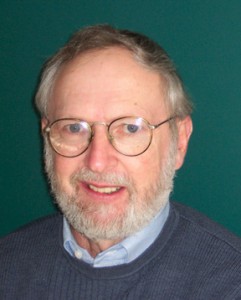
Last week, I wrote about George Marsden‘s address to InterVarsity Graduate and Faculty Ministries staff, “The Soul of the American University Revisited.” Dr. Marsden suggested that worldview naturalism —also called ideological or metaphysical naturalism —was losing its hold on the academy. In contrast, methodological naturalism remained strong and, indeed, was an appropriate stance for Christians in academia. It’s this form of naturalism that I want to focus on today.
Here’s how J. P. Moreland and William Lane Craig describe methodological naturalism in their (massive) book, Philosophical Foundations for a Christian Worldview [n. b. this is Moreland and Craig’s description of the position, not necessarily their own positions]:
[In the natural sciences, e]xplanations should refer only to natural objects and events and not to the personal choices and actions of human and divine agents. Natural science seeks knowledge of the physical properties, behavior and formative history of the physical world….Within science, we should adopt methodological naturalism, according to which answers to questions are sought within nature… (358, emphasis added)
I appreciate their inclusion of human agents in this definition, because I think it can build a bridge to scientists who don’t share a theistic perspective. If I’m a scientist asking why a cannonball falls toward the earth, it’s not appropriate to answer “because I dropped it out the window,” even though that might be a perfectly acceptable answer in, say, a court of law in which I’m being prosecuted for assaulting someone with said cannonball.
Likewise, there are other contexts in which methodological naturalism is highly inappropriate. Staying with the law court example, I would be cited for contempt if I began describing gravity wells when the prosecutor asked me, “How did the cannonball come to strike Tom Grosh in the head?”
Marsden reiterated his endorsement for methodological naturalism as an appropriate stance for Christians in the academy. Here’s how he put it in The Outrageous Idea of Christian Scholarship:
In the corridors of the pragmatic academy Christians and non-Christians can readily share basic standards of evidence and argument. These standards work in separating good arguments from bad, and on many topics they can establish a sort of “public knowledge” that persons from many ideological sub-communities can agree on and which are not simply matters of opinion. Christians and non-Christians likely will use precisely the same methods in determining the date when George Washington crossed the Delaware… (47, emphasis added)
There’s a tension, though, between methodological naturalism and a basic conviction of most evangelical Christians —that Jesus is Lord of our whole life. Even if you haven’t read Robert Boyd Munger’s classic booklet My Heart —Christ’s Home, you’ve probably heard the basic idea: we can’t bar Jesus from any “room of our house” (i.e. area of our life); indeed, Jesus is the one who should own the house.
In fact, just before he discussed naturalism, Marsden suggested that Christians should adopt a kind of “Kuyperian pluralism” in the modern academy, in which we reject the de facto Christian dominance that reigned in higher education until the early 20th century, but also insist on a “principled pluralism” that recognizes that Christians and non-Christians won’t see all things in the same way. (By the way, I’m no expert on Kuyper, but I think Kuyper outlines his view of pluralism in his 3rd Stone Lecture on Calvinism and Politics. If you know of a better link or location, please share it in the comments.)
So, I asked Dr. Marsden this question at the end of his talk:
Since we agree that methodological naturalism is a good way of doing academic work, but that privatization is a bad way of living out our faith, how do Christian scholars integrate their faith with their academic work?
Interestingly, commenter RedWell expressed a very similar thought this week on the final post of our Outrageous Idea book discussion:
[Christian academic networks] often turn into Christians researching how “religion” intersects with a scholar’s field. … [In disciplines like math and physics,] it’s hard to see what role a Christian organization would play beyond personal edification.
I’ll share Marsden’s answer to my question next week, but for now, what are your thoughts? How can Christians avoid privatizing their faith while still participating in the “pragmatic academy”?
The former Associate Director for the Emerging Scholars Network, Micheal lives in Cincinnati with his wife and three children and works as a web manager for a national storage and organization company. He writes about work, vocation, and finding meaning in what you do at No Small Actors.

Michael, Christianity plays a role primarily in the *philosophy of* disciplines like mathematics or physics. See my book The Soul of Science.
Nancy,
Thank you – here is the link for anyone who (like me) will be taking a look at your work on the subject.
I think you’re right that the clearest integrative work is in the “philosophy of X,” but few scholars work in those specialties. Is there a role for faith in their day-to-day work?